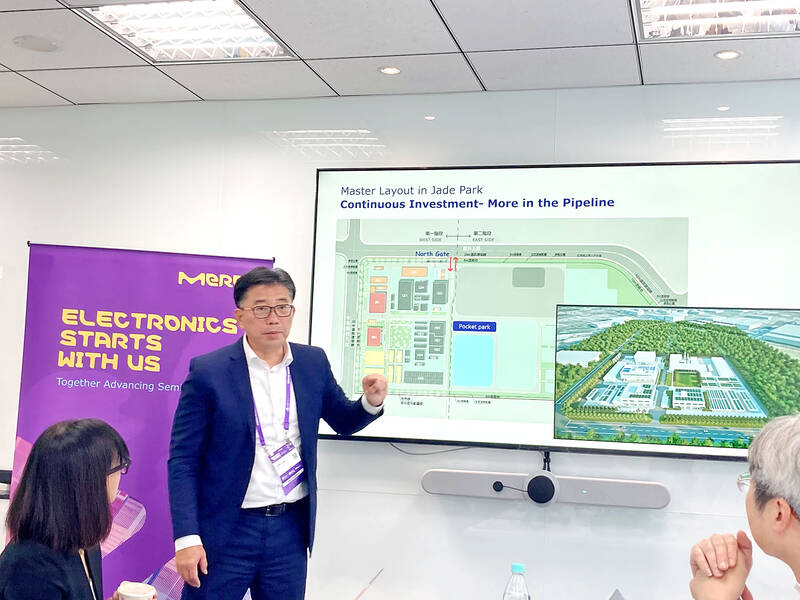Merck Group on Wednesday said it plans to introduce more key semiconductor materials used in cutting-edge semiconductor manufacturing technologies after a new facility in Kaohsiung’s Lujhu District (路竹) starts operations next year, further boosting the company’s product localization rate.
The company has since 2019 increased local sourcing in Taiwan and relocated production from other countries like the US, Europe and some Asian countries in response to customers’ demand and geopolitical risks.
As of the end of July, more than 50 percent of Merck’s semiconductor products were sourced from local suppliers, Merck Group in Taiwan managing director John Lee (李俊隆) told a media briefing in Taipei.

Photo: Lisa Wang, Taipei Times
Among the broad semiconductor material portfolios, specialty gases had the highest localization rate of 66 percent, followed by thin-film products’ 54 percent, Merck data showed.
The company is stepping up product localization to cope with major semiconductor customers’ shifting to more advanced technologies from 7-nanometer to 5-nanometer and even to 1.6-nanometer process nodes, Lee said.
“We plan to introduce novel materials, which will be in production for the first time in Taiwan, and allocate production of some existing materials from neighboring countries when the new plant is completed,” Lee said.
Those new materials are likely to be used in the thin-film deposition process for the advanced technology nodes, Lee said.
Merck also plans to expand the supply of specialty gases for doping, cleaning and etching in particular, he said.
The new plant is a part of Merck’s “Level Up” program for its electronics business, with investment totaling more than 3 billion euros (US$3.33 billion) by next year. Merck has earmarked an investment of NT$17 billion (US$530 million) in Taiwan.
When asked if the locally made semiconductor materials could address the surging demand for artificial intelligence (AI) chips, Merck KGaA executive vice president Suresh Rajaraman said: “As advanced technologies are used for AI, so you can say the investment we are making is to enable AI.”
Producing AI chips with strong computing power and energy efficiency requires more new and complex materials, Rajaraman said.
Merck has used about 25 percent of elements on the periodic table to invent new materials, Rajaraman said.
Any existing non-radioactive element is “in play,” he said.

When an apartment comes up for rent in Germany’s big cities, hundreds of prospective tenants often queue down the street to view it, but the acute shortage of affordable housing is getting scant attention ahead of today’s snap general election. “Housing is one of the main problems for people, but nobody talks about it, nobody takes it seriously,” said Andreas Ibel, president of Build Europe, an association representing housing developers. Migration and the sluggish economy top the list of voters’ concerns, but analysts say housing policy fails to break through as returns on investment take time to register, making the

‘SILVER LINING’: Although the news caused TSMC to fall on the local market, an analyst said that as tariffs are not set to go into effect until April, there is still time for negotiations US President Donald Trump on Tuesday said that he would likely impose tariffs on semiconductor, automobile and pharmaceutical imports of about 25 percent, with an announcement coming as soon as April 2 in a move that would represent a dramatic widening of the US leader’s trade war. “I probably will tell you that on April 2, but it’ll be in the neighborhood of 25 percent,” Trump told reporters at his Mar-a-Lago club when asked about his plan for auto tariffs. Asked about similar levies on pharmaceutical drugs and semiconductors, the president said that “it’ll be 25 percent and higher, and it’ll

CHIP BOOM: Revenue for the semiconductor industry is set to reach US$1 trillion by 2032, opening up opportunities for the chip pacakging and testing company, it said ASE Technology Holding Co (日月光投控), the world’s largest provider of outsourced semiconductor assembly and test (OSAT) services, yesterday launched a new advanced manufacturing facility in Penang, Malaysia, aiming to meet growing demand for emerging technologies such as generative artificial intelligence (AI) applications. The US$300 million facility is a critical step in expanding ASE’s global footprint, offering an alternative for customers from the US, Europe, Japan, South Korea and China to assemble and test chips outside of Taiwan amid efforts to diversify supply chains. The plant, the company’s fifth in Malaysia, is part of a strategic expansion plan that would more than triple

Taiwanese artificial intelligence (AI) server makers are expected to make major investments in Texas in May after US President Donald Trump’s first 100 days in office and amid his rising tariff threats, Taiwan Electrical and Electronic Manufacturers’ Association (TEEMA, 台灣電子電機公會) chairman Richard Lee (李詩欽) said yesterday. The association led a delegation of seven AI server manufacturers to Washington, as well as the US states of California, Texas and New Mexico, to discuss land and tax issues, as Taiwanese firms speed up their production plans in the US with many of them seeing Texas as their top option for investment, Lee said. The